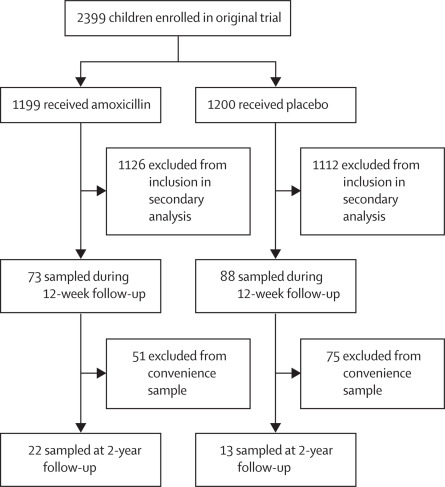💡 This study presents a secondary analysis of a randomized, double-blinded, placebo-controlled trial conducted in children aged 6-59 months with severe acute malnutrition (SAM) who were treated as outpatients in Madarounfa, Niger.
📌 The study aimed to assess the acute and long-term effects of a 7-day course of amoxicillin on the gut microbiome and antibiotic resistome.
📌 Faecal samples from children were analyzed using metagenomic sequencing, and the findings reveal immediate reductions in microbiome richness, transient antibiotic resistance gene (ARG) abundance, and a shift towards a more mature gut microbiome following amoxicillin treatment.
📌 The report discusses the implications of these findings and the potential benefits of microbiota-directed therapeutic foods for optimizing SAM treatment.
📍 Methods:
Study Population: Children aged 6-59 months with severe acute malnutrition were enrolled in a randomized, double-blinded, placebo-controlled trial.
Sample Collection: Faecal samples were collected from children at multiple time points, including baseline, week 1, week 4, week 8, week 12, and, for a subset, week 104.
Metagenomic Sequencing: Sequencing was performed to analyze the gut microbiome and resistome profiles.
Reference Controls: A group of children without SAM and children with SAM matching the baseline ages of the original cohort were included as reference controls.
📍 Key Findings:
In the 12-week follow-up group, amoxicillin resulted in an immediate decrease in gut microbiome richness and Shannon diversity index (SDI). These reductions were observed at week 1 but returned to baseline levels by week 4.
The abundance of antibiotic resistance genes (ARGs) in the gut increased at week 1 following amoxicillin treatment but returned to baseline levels within 3 weeks.
In the 2-year follow-up group, amoxicillin-treated children displayed an increased number of species in the gut microbiome compared to placebo-treated children, indicating a more mature, adult-like microbiome.
The amoxicillin-treated group exhibited an increased abundance of 𝘗𝘳𝘦𝘷𝘰𝘵𝘦𝘭𝘭𝘢 𝘴𝘱𝘱 and a decreased abundance of 𝘉𝘪𝘧𝘪𝘥𝘰𝘣𝘢𝘤𝘵𝘦𝘳𝘪𝘶𝘮 𝘴𝘱𝘱 relative to age-matched placebo-treated children.
Despite both amoxicillin-treated and placebo-treated children showing anthropometric improvement over the 12-week and 2-year follow-up, the gut microbiome of placebo-treated children maintained an age-regressed composition relative to amoxicillin-treated children and non-SAM controls.
📌 This study offers valuable insights into the potential benefits and risks of routine amoxicillin administration in children with uncomplicated SAM. The findings indicate that while amoxicillin may induce transient perturbations in the gut microbiome and antibiotic resistome, it ultimately promotes microbiome maturation and nutritional recovery. The study emphasizes the importance of microbiome modification as a component of SAM treatment.
Link to the article : https://tinyurl.com/2uxzpf2f
